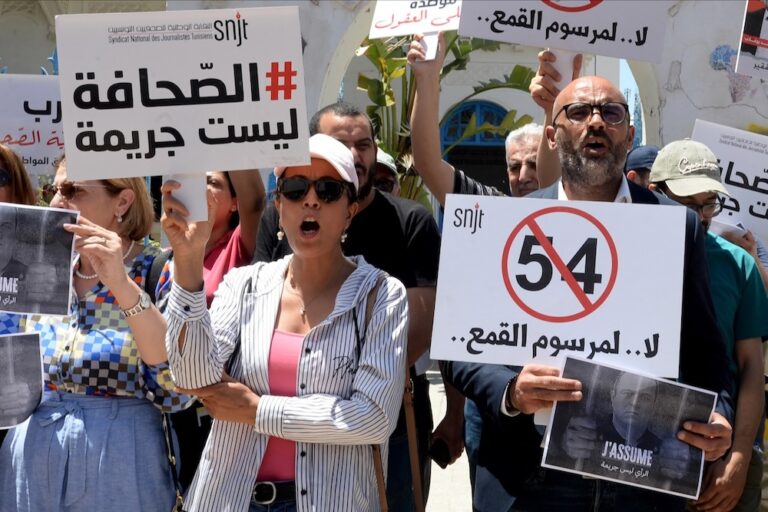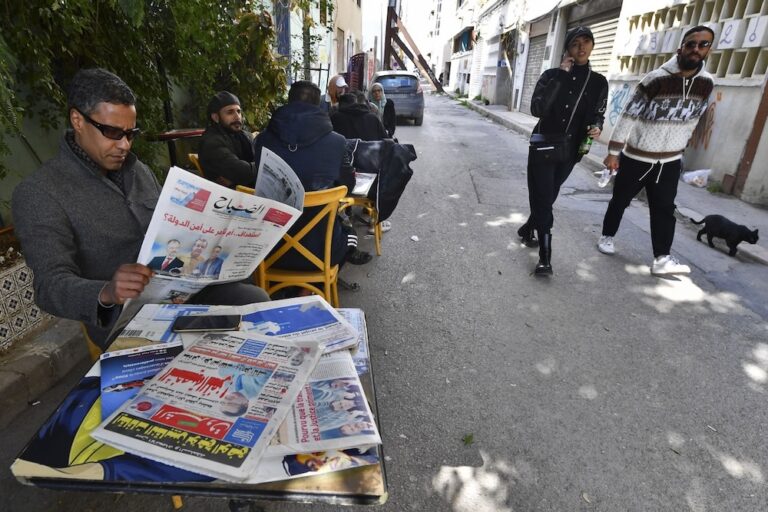(RSF/IFEX) – In a letter to Tunisian President Zine el-Abidine Ben Ali, RSF protested the fact that a large number of foreign telephone numbers have been made inaccessible from Tunisia and that many opposition figures’ telephone lines have been cut. Access to the Internet has also become extremely difficult and mail sent to opponents does […]
(RSF/IFEX) – In a letter to Tunisian President Zine el-Abidine Ben Ali, RSF protested the fact that a large number of foreign telephone numbers have been made inaccessible from Tunisia and that many opposition figures’ telephone lines have been cut. Access to the Internet has also become extremely difficult and mail sent to opponents does not always arrive. RSF Secretary-General Robert Ménard asked the president “to take the necessary measures to put an end to the government’s seizure of the means of communication.” “This attitude demonstrates that the Tunisian authorities are trying to prevent Tunisians from communicating with the outside world through any means possible,” added Ménard.
According to information collected by RSF, the fixed and mobile telephone lines of many opposition figures, including Sihem Bensedrine, Taoufik Ben Brik, Moncef Marzouki and Mustapha Ben Jaffar, have been cut. In the past few weeks, it has been impossible to call certain foreign numbers from inside Tunisia, from either fixed or mobile phones, or even from French mobile phones. Tunisians can no longer reach organisations such as RSF, the International Federation of Human Rights (IFHR) and Human Rights Watch; nor can they reach journalists like Jean-Pierre Tuquoi of “Le Monde”, Florence Aubenas of “Libération”, Daniel Mermet of France Inter, Nicolas Beau of “Le Canard Enchaîné”, Philippe Val of “Charlie Hebdo” and others. The telephone numbers of several European members of parliament, including Daniel Cohn-Bendit, Hélène Flautre and Harlem Désir, are also on the blacklist. Tunisian businessmen and human rights activists who live in France, and anyone else known to be involved in the fight for greater freedom in Tunisia, have had their phone numbers blocked by the Tunisian authorities. Access to the Internet is also very difficult. It takes hours to log on and many news sites, such as those of Libération.fr and those concerned with human rights, are totally inaccessible. Ordinary mail is also strictly controlled – it either never arrives or is first opened.
More “traditional” forms of pressure are also being maintained. Journalist Bensedrine’s car was vandalised on the evening of 4 December 2001. The side-view mirror and licence plate were ripped off and the antenna was bent. On 2 December, a long interview with the human rights activist was broadcast on the London-based television channel Al Mustakillah, in which she spoke about her conditions of detention in July (see IFEX alerts of 6 September, 24 August, 6 July and 27 June 2001).
RSF also recalls that Tunisian President Ben Ali is included on the organisation’s list of the world’s thirty-nine press freedom predators.


